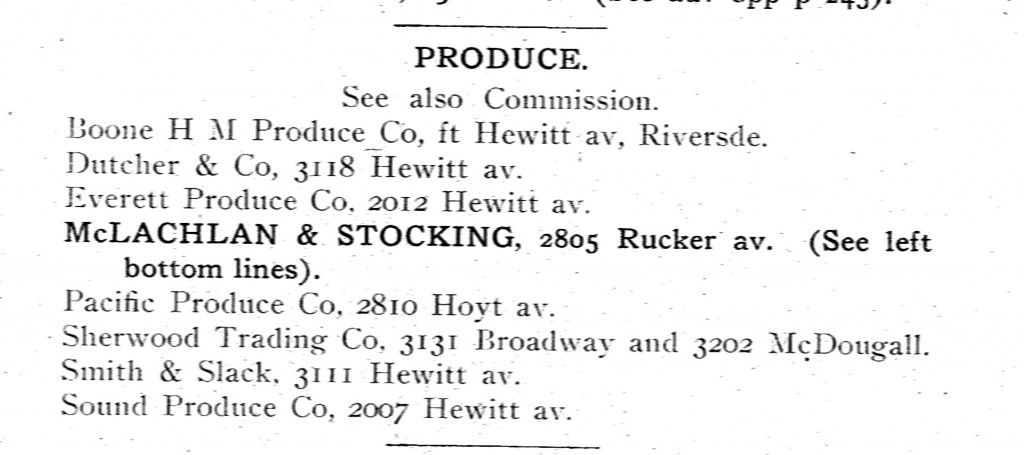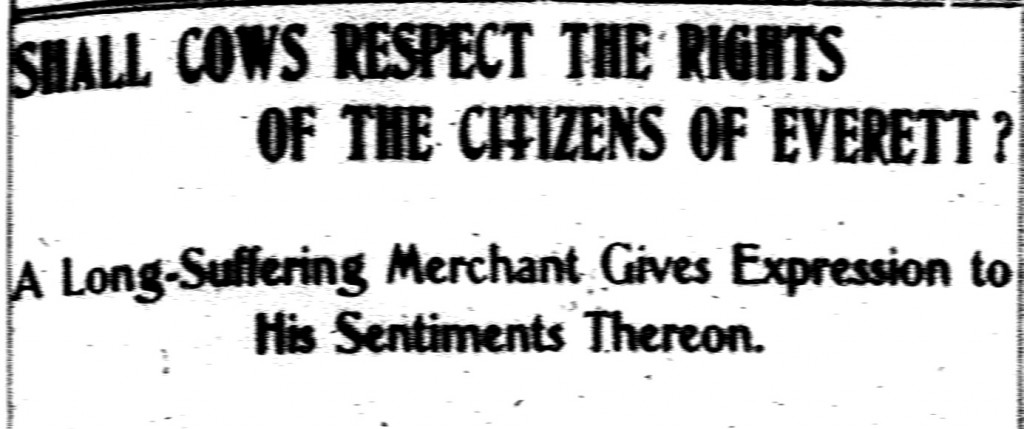 Random News from the Newspapers on Microfilm Collection: Kleptomaniac Cows in Everett
Random News from the Newspapers on Microfilm Collection: Kleptomaniac Cows in Everett
From the desk of Steve Willis, Central Library Services Program Manager of the Washington State Library:
Ah, the growing pains of urbanization as found in the Feb. 20, 1901 issue of the Everett Daily Herald:
SHALL COWS RESPECT THE RIGHTS OF THE CITIZENS OF EVERETT?
A Long-Suffering Merchant Gives Expression to His Sentiments Thereon.
“The business men of the city have under serious advisement the matter of protection against the festive and ubiquitous cow. They say she is a nuisance of the first order and they believe that she should be suppressed.”
“Yesterday afternoon a Herald man was talking with a Hewitt avenue produce dealer. There were several bales of hay on the sidewalk. A cultured, ‘gentlemanly’ looking cow approached and began gingerly partaking of the hay. The produce man did not notice her at first and she warmed up to her task with considerable alacrity. Finally the produce dealer spied the cow. Being a Christian gentleman he said ‘Doggin that cow!’ and charged her in a way which led to the belief that he had left over several more expletives of a more vigorous nature. Returning he said:”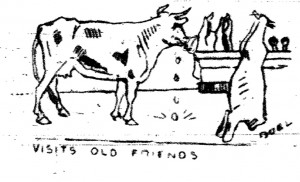
“‘That makes twenty-seven times I’ve driven that cow away from the hay. Is there no respite, no balm of Gilead, I implore? If I should shoot that cow, would I have to pay for her?'”
“‘You might make the experiment,’ suggested the newspaperman.”
“‘I’ll tell you,’ continued the produce dealer. ‘I am getting mighty tired of this. I understand there is an ordinance against cows and other stock running at large and the city has a poundmaster, but I have never been able to see any of the beneficial results.'”
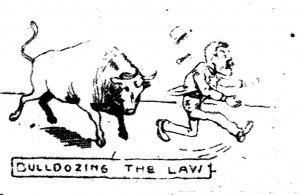 ”Of course they annoy grocers and produce dealers more than other business men. They hang around and eat our high priced vegetables when we are not looking, and occasionally I’ve been told they make a meal of men’s or women’s furnishing goods left on the street for advertising purposes; but their diet is usually confined more strictly to food products for man and beast.'”
”Of course they annoy grocers and produce dealers more than other business men. They hang around and eat our high priced vegetables when we are not looking, and occasionally I’ve been told they make a meal of men’s or women’s furnishing goods left on the street for advertising purposes; but their diet is usually confined more strictly to food products for man and beast.'”
”What remedy would you suggest?’ was asked. ‘Would you suggest that the cow be cured of her kleptomaniacal traits, educated and improved in her ways so that she may be able to take her place in society, to walk along the streets of this city fast assuming metropolitan airs with the busy throng without molesting other people’s property, and knowing which way to turn when she meets a pedestrian on the sidewalk?'”
“The produce man looked pained: ‘I’m in earnest about this matter,’ he said: ‘there’s that infernal cow again! Where’s my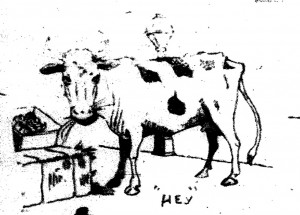 gun? I’ll kill her! But let her go this time. Maybe she’s not prepared to die.'”
gun? I’ll kill her! But let her go this time. Maybe she’s not prepared to die.'”
“‘No,’ he continued, ‘I would suggest nothing of the sort. The remedy should exist in enforcing our present city ordinances and if they are not sufficient, others which are should be enacted. But the idea of allowing cattle to run at large in a town fast taking on the airs of a city is ridiculous beyond words to say nothing of the annoyance.'”
“‘It should be remembered that cities do not inflict their live stock on the bosom of the general public, and that the average individual does not care to be jostled or elbowed by the mild-eyed cow however chaste of well bred she may be.'”
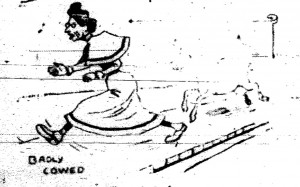 “‘I hope to goodness the chamber of commerce will appoint an entertainment committee for the cows and keep them out of sight during the coming visit of the state legislature to Everett.'”
“‘I hope to goodness the chamber of commerce will appoint an entertainment committee for the cows and keep them out of sight during the coming visit of the state legislature to Everett.'”
In 1901 Everett was less than a decade old as an incorporated city. The population, according to the 1900 census, was 7,838. But by 1910 the city has exploded to a population of 24,814. Everett was indeed “fast taking on the airs of a city.”
We don’t know the identity of the grocer, but in the Polk Directory for 1901 no less than five produce dealers had shops on Hewitt Ave. Of course, it is highly likely this particular grocer was fictional.






